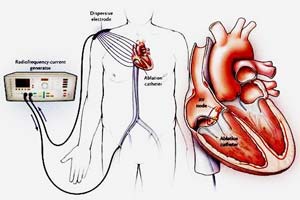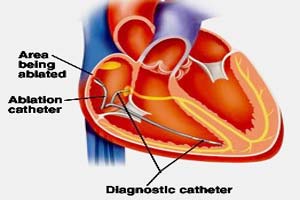What Is Catheter Ablation?

- Catheter ablation (ab-LA-shun) is a medical procedure used to treat some arrhythmias (ah-RITH-me-ahs). An arrhythmia is a problem with the speed or rhythm of the heartbeat.
- During catheter ablation, a long, thin, flexible tube is put into a blood vessel in your arm, groin (upper thigh), or neck.
- This tube is called an ablation catheter. It’s then guided to your heart through the blood vessel. A special machine sends energy through the catheter to your heart.
- This energy finds and destroys small areas of heart tissue where abnormal heartbeats may cause an arrhythmia to start.
What are the other names for Catheter Ablation?
- Ablation
- Cardiac ablation
- Cardiac catheter ablation
- Radiofrequency ablation
- Catheter cryoblation
Check out the Patient Testimonial, where the patient shares about their success stories from treatments through India Cardiac Surgery Consultants.
Who Needs Catheter Ablation?
Your doctor may recommend catheter ablation if :
- You have an arrhythmia that medicine can’t control.
- You can’t tolerate the medicines your doctor has prescribed for your arrhythmia.
- You have certain types of arrhythmia, such as Wolff-Parkinson-White syndrome or some forms of atrial fibrillation.
- You have abnormal electrical activity in your heart that raises your risk for ventricular fibrillation (a life-threatening arrhythmia) and sudden cardiac arrest.
What to Expect Before Catheter Ablation?
Before having catheter ablation, discuss with your doctor :
- How to prepare for the procedure, including limits on eating and drinking. You will likely need to stop eating and drinking by midnight before the procedure. Your doctor will give you specific instructions.
- Any medicines you’re taking, and whether you should stop taking them before the procedure.
- Whether you have diabetes, kidney disease, or other conditions that may require taking extra steps during or after the procedure to avoid complications.
- Some people go home the same day as the procedure. Others need to stay overnight for 1 or more days. Driving after the procedure may not be safe. Your doctor will let you know if you need to arrange for someone to drive you home.
What should you expect during the Procedure?
- Electrodes at the end of the catheter are used to stimulate the heart and record its electrical activity. This helps your doctor learn where abnormal heartbeats are starting in your heart.
- Your doctor aims the tip of the catheter at the small area of heart tissue where the abnormal heartbeats are starting.
- A special machine sends energy through the catheter to create a scar line, also called an ablation line. The types of energy used include radiofrequency (heat generated by electrodes), laser, or cryo- (very cold temperatures).
- The animation below shows catheter ablation. Click the “start” button to play the animation. Written and spoken explanations are provided with each frame.
- Use the buttons in the lower right corner to pause, restart, or replay the animation, or use the scroll bar below the buttons to move through the frames.
- The animation shows an ablation catheter inserted into the heart. This catheter is used to destroy, or ablate, a small part of the heart muscle that’s causing arrhythmias. The process allows the heart to return to its normal rhythm.
What to Expect After Catheter Ablation?

- After the procedure, you’re moved to a special care unit where you lie still for 4 to 6 hours of recovery.
- Lying still prevents bleeding at the site where the catheter was inserted.
- While you’re in the special care unit, you’re connected to special devices that measure your heart’s electrical activity and blood pressure.
- The nurses check these monitors continuously. Nurses also check to make sure that there’s no bleeding at the catheter insertion site.
What precautions would need to undertake after undergoing Catheter Ablation?
- Recovery from catheter ablation is usually quick. You may feel stiff and achy from lying still for 4 to 6 hours after the procedure. In addition, a small bruise may form at the site where the ablation catheter was inserted. The area may feel sore or tender for about a week. Most people are able to return to normal activity in a few days.
- Talk to your doctor about signs and symptoms to watch for. Let your doctor know if you have problems such as :
- A constant or large amount of bleeding at the catheter insertion site that you can’t stop with a small bandage
- Unusual pain, swelling, redness, or other signs of infection at or near the catheter insertion site
- Strong, rapid, or other irregular heartbeats
- Fainting
What are the benefits of planning your Catheter Ablation with India Cardiac Surgery?
9 benefits of planning your Catheter Ablation with India Cardiac Surgery Team :
- Best Hospitals
- Top Surgeons
- Low Cost Treatment Quotation
- Huge Savings
- No wait time
- All inclusive packages
- Multilingual Patient Executives
- Free concierge services
- Thousands of happy patients
Mr. Ivan Louis from Australia shares his experience of Catheter Ablation Surgical Treatment done in India

Mr. Ivan Louis from Australia
Though it was not a life threatening ailment, I was really scared when I was diagnosed with an ablation few years ago. I consulted many doctors regarding the treatments and solutions, but it was only when I connected with the Indian cardiac surgery group that I felt that I am going to be treated by the right hands. They were very thorough in telling me about the details of my condition and what should I be expecting at each stage. I decided to go for surgical option because I did not wanted any complications in the later stage and the doctors made sure that my treatment was finely done to eliminate the problem completely.
If you are ready to proceed for discussion and planning for treatment in India, you can fill the contact form below and we will get in touch with you very soon. Please feel free to ask all your queries & concerns.

